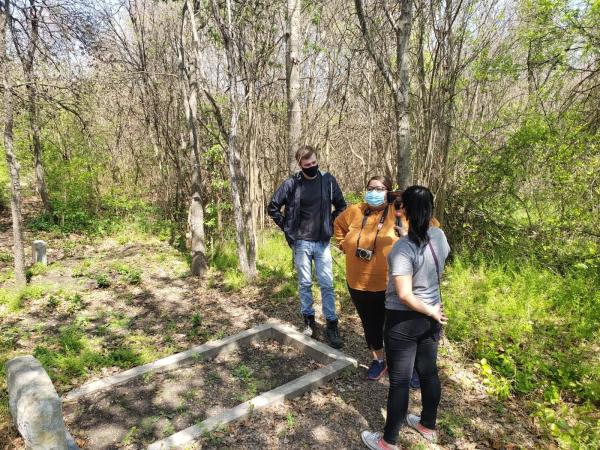Graduate Students Work to Document, Protect and Preserve BIPOC Sacred Spaces

Over the past year, two School of Architecture graduate students – Diana Hernandez (MSHP ’21) and Mitch Ford (MSCRP ’21) – have been working to document, protect and preserve sites of significance for Black, Indigenous and People of Color (BIPOC) and marginalized communities. The pair co-founded the (Re)claiming Memories Research Lab early last year to collectively restore missing and forgotten histories and to advocate for the historic preservation of communities, sacred spaces, and BIPOC sites of significance.
The lab—comprised of an interdisciplinary group of graduate students, recent grads, and professionals based out of The University of Texas at Austin—grew out of Diana’s research for her master’s thesis for which she has been documenting the history of a Mexican American burial ground in southeast Austin. Established in 1919, the San Jose Cemetery is currently at risk of being destroyed by the growth, construction, and gentrification taking place near the site.
“Growing up in a Mexican household, visits to the cemetery were a part of our cultural and spiritual practices,” Hernandez said. “When I drove by Cementerio San Jose for the first time, it was the first time I felt a connection to my heritage here in Austin, and that was a driving force in my determination to protect this site. I decided to form (Re)claiming Memories with Mitch and the rest of the team because I knew that I couldn’t do this alone, and I have always believed that we are stronger and more effective when we work together.”
As part of their work this year, Diana and Mitch have hosted multiple walk-throughs and tours of the cemetery with community leaders like Councilwoman Vanessa Fuentes and media outlets like Fox 7 Austin to help raise awareness of the site and the importance of its preservation.
“Gentrification is a threat to the cemetery and the entire Montopolis neighborhood,” Ford said. “Construction in the area not only impacts the cemetery’s boundary, privacy, and historical integrity, but it also threatens to erase the memories, stories, and history housed here. I think collaborations like ours, between planners and preservationists, need to happen much more often especially for BIPOC sacred spaces. Planners often forget the importance of historic preservation and how it contributes to making cities more desirable places to live.”
Watch the Fox 7 segments here: Part 1: San Jose Cementerio, Part 2: Fighting to Save Sacred Spaces
Beyond their work on the San Jose Cemetery, Diana, Mitch, and the (Re)claiming Memories team have also hosted two symposia over the past academic year. The first, “The Necopolis Politic: Mourning, Reclamation & Preservation in BIPOC Sacred Spaces,” featured scholarly and creative work related to past and present knowledge of rituals for processing loss, research on remembrance, and struggles for reclaiming historical memory. Hosted in collaboration with the Latinx theater group Proyecto Teatro on Dia de Muertos, the symposia offered an opportunity for researchers from across Texas to present their work in a space that honored and acknowledged the dead.
Building off the success of the first symposia, the team’s second event was a celebration of life rather than death. Inspired by the migration of the monarch butterfly and its associated symbolism in Mexican culture, the symposia, “Ciclos: Rebirth, Migration & Placemaking” hosted in collaboration with Dr. Andera Roberts’ Texas Freedom Colonies Project, explored narratives of rebirth, regeneration, and hope across landscapes of memory and geospatial dimensions.
The two events brought dozens of scholars and creatives together from around the world, including Chile, Guam, Haiti, Lebanon, and Peru to discuss the importance of historic preservation, BIPOC spaces and storytelling, and to share knowledge about how we can preserve, protect, and promote these spaces and communities. To learn more about the (Re)Claiming Memories Research Lab, visit their website, and check out recordings from the two-day Ciclos symposia on the Texas Architecture YouTube channel here and here.
